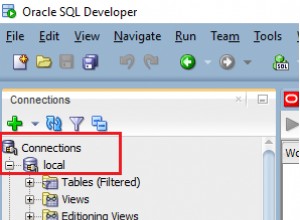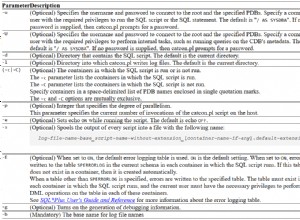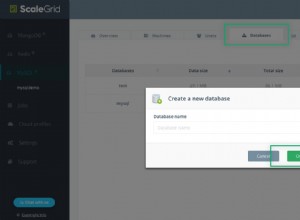Ecco cosa ho adattato dalla risposta di @Lieven, incorporando il feedback di qui per prestazioni migliori:
DROP PROCEDURE IF EXISTS tree_recover;
DELIMITER //
CREATE PROCEDURE tree_recover ()
MODIFIES SQL DATA
BEGIN
DECLARE currentId, currentParentId CHAR(36);
DECLARE currentLeft INT;
DECLARE startId INT DEFAULT 1;
# Determines the max size for MEMORY tables.
SET max_heap_table_size = 1024 * 1024 * 512;
START TRANSACTION;
# Temporary MEMORY table to do all the heavy lifting in,
# otherwise performance is simply abysmal.
CREATE TABLE `tmp_tree` (
`id` char(36) NOT NULL DEFAULT '',
`parent_id` char(36) DEFAULT NULL,
`lft` int(11) unsigned DEFAULT NULL,
`rght` int(11) unsigned DEFAULT NULL,
PRIMARY KEY (`id`),
INDEX USING HASH (`parent_id`),
INDEX USING HASH (`lft`),
INDEX USING HASH (`rght`)
) ENGINE = MEMORY
SELECT `id`,
`parent_id`,
`lft`,
`rght`
FROM `tree`;
# Leveling the playing field.
UPDATE `tmp_tree`
SET `lft` = NULL,
`rght` = NULL;
# Establishing starting numbers for all root elements.
WHILE EXISTS (SELECT * FROM `tmp_tree` WHERE `parent_id` IS NULL AND `lft` IS NULL AND `rght` IS NULL LIMIT 1) DO
UPDATE `tmp_tree`
SET `lft` = startId,
`rght` = startId + 1
WHERE `parent_id` IS NULL
AND `lft` IS NULL
AND `rght` IS NULL
LIMIT 1;
SET startId = startId + 2;
END WHILE;
# Switching the indexes for the lft/rght columns to B-Trees to speed up the next section, which uses range queries.
DROP INDEX `lft` ON `tmp_tree`;
DROP INDEX `rght` ON `tmp_tree`;
CREATE INDEX `lft` USING BTREE ON `tmp_tree` (`lft`);
CREATE INDEX `rght` USING BTREE ON `tmp_tree` (`rght`);
# Numbering all child elements
WHILE EXISTS (SELECT * FROM `tmp_tree` WHERE `lft` IS NULL LIMIT 1) DO
# Picking an unprocessed element which has a processed parent.
SELECT `tmp_tree`.`id`
INTO currentId
FROM `tmp_tree`
INNER JOIN `tmp_tree` AS `parents`
ON `tmp_tree`.`parent_id` = `parents`.`id`
WHERE `tmp_tree`.`lft` IS NULL
AND `parents`.`lft` IS NOT NULL
LIMIT 1;
# Finding the element's parent.
SELECT `parent_id`
INTO currentParentId
FROM `tmp_tree`
WHERE `id` = currentId;
# Finding the parent's lft value.
SELECT `lft`
INTO currentLeft
FROM `tmp_tree`
WHERE `id` = currentParentId;
# Shifting all elements to the right of the current element 2 to the right.
UPDATE `tmp_tree`
SET `rght` = `rght` + 2
WHERE `rght` > currentLeft;
UPDATE `tmp_tree`
SET `lft` = `lft` + 2
WHERE `lft` > currentLeft;
# Setting lft and rght values for current element.
UPDATE `tmp_tree`
SET `lft` = currentLeft + 1,
`rght` = currentLeft + 2
WHERE `id` = currentId;
END WHILE;
# Writing calculated values back to physical table.
UPDATE `tree`, `tmp_tree`
SET `tree`.`lft` = `tmp_tree`.`lft`,
`tree`.`rght` = `tmp_tree`.`rght`
WHERE `tree`.`id` = `tmp_tree`.`id`;
COMMIT;
DROP TABLE `tmp_tree`;
END//
DELIMITER ;
Ha funzionato bene con alcuni dati di test, ma è ancora in esecuzione sul mio albero di 100.000 record, quindi non posso ancora dare un giudizio definitivo. Lo script ingenuo che lavora direttamente sul tavolo fisico ha prestazioni pessime, in esecuzione per almeno ore, giorni più probabili. Passare a una tabella MEMORY temporanea ha ridotto questo tempo a circa un'ora, scegliendo gli indici giusti lo ha ridotto a 10 minuti.




